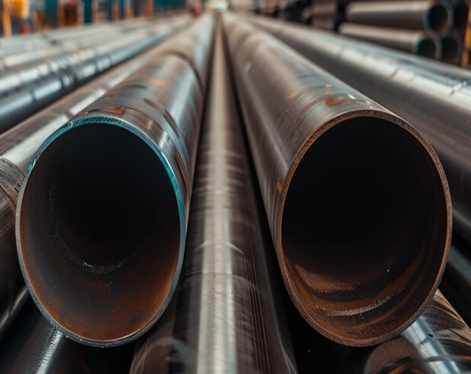Passivation principle of seamless pipe
Passivation is due to the interaction between the metal and the oxidizing properties, and a very thin, dense, good covering performance, and a passivation film firmly adsorbed on the metal surface are formed on the metal surface. This film exists in phases, usually compounds of oxidized metals. It plays the role of completely separating the metal from the corrosive medium, preventing the metal from contacting the corrosive medium, so that the metal basically stops dissolving and forms a passive state to prevent corrosion.

Advantages of seamless pipe passivation
1. Compared with the traditional physical sealing method, after passivation treatment, it has the characteristics of absolutely not increasing the thickness of the workpiece and changing the color, improving the stability and added value of the product, and making the operation more convenient;
2. Since the passivation process is carried out in a non-reactive state, the passivation agent can be added repeatedly, so the service life is longer and the cost is more economical
3. Passivation promotes the formation of a passivation film with an oxygen molecular structure on the metal surface. The film is dense, stable in performance, and has a self-repairing effect in the air. Therefore, compared with the traditional method of applying anti-rust oil, the bell oxide film formed by passivation is more stable and more corrosion-resistant. Passivation treatment is a process step that ends in chemical cleaning and is a key step. After the boiler is pickled, washed with water and washed with alcohol, the metal surface is very clean, very activated, and is easily corroded, so passivation treatment must be carried out immediately to form a protective film on the washed metal surface to slow down corrosion.
Passivation is due to the interaction between the metal and the oxidizing properties, and a very thin, dense, good covering performance, and a passivation film firmly adsorbed on the metal surface are formed on the metal surface. This film exists in phases, usually compounds of oxidized metals. It plays the role of completely separating the metal from the corrosive medium, preventing the metal from contacting the corrosive medium, so that the metal basically stops dissolving and forms a passive state to prevent corrosion.

Advantages of seamless pipe passivation
1. Compared with the traditional physical sealing method, after passivation treatment, it has the characteristics of absolutely not increasing the thickness of the workpiece and changing the color, improving the stability and added value of the product, and making the operation more convenient;
2. Since the passivation process is carried out in a non-reactive state, the passivation agent can be added repeatedly, so the service life is longer and the cost is more economical
3. Passivation promotes the formation of a passivation film with an oxygen molecular structure on the metal surface. The film is dense, stable in performance, and has a self-repairing effect in the air. Therefore, compared with the traditional method of applying anti-rust oil, the bell oxide film formed by passivation is more stable and more corrosion-resistant. Passivation treatment is a process step that ends in chemical cleaning and is a key step. After the boiler is pickled, washed with water and washed with alcohol, the metal surface is very clean, very activated, and is easily corroded, so passivation treatment must be carried out immediately to form a protective film on the washed metal surface to slow down corrosion.









